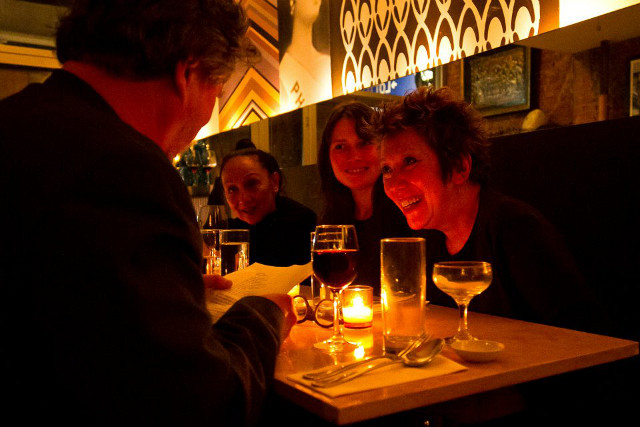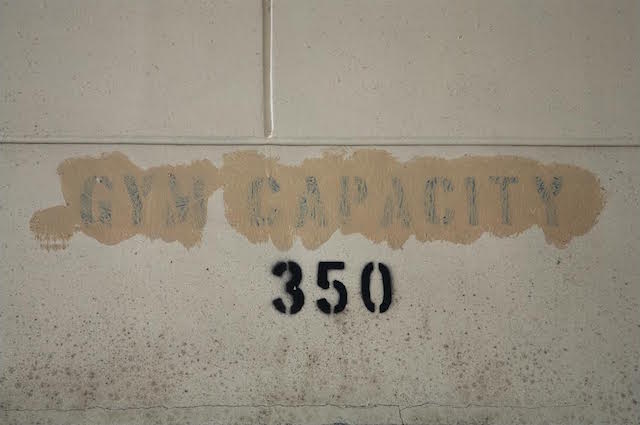They always had us at hello, the Americans.

October 11, 2017

As more companies choose to outsource services, other remittances take place alongside the obvious ones of labor and wages. In the case of call centers, it is cultural context that must be trafficked, with low-paid workers being compelled to mimic Americans for the comfort of their customers. In this extract from his puckish new novel, Glenn Diaz brings us into a world where identity is performance.
from The Quiet Ones
Unknown to them, we could tell when they were listening in on our calls. Common signals included a split-second, sporadic choppiness on the line and a Darth Vader echo even for agents like Karen, who was known all over the operations floor for hiking her already high-pitched voice whenever she spoke to a male heterosexual caller.
“Don’t know what you guys are talking about,” she said when we brought it up during a yosi break. We shrugged and had moved on to something else when she cried, “Fine! Just stop badgering me!” She took a quick drag at her menthol.
“It’s a strategy. Sounding girly and helpless. Letting them think they have the power. Men like that. They let their guard down and shit. Then I sell them something they don’t need.”
What psychological depth, we thought. Many among us didn’t have units in psychology. We were graduates of applied math and sociology, biology and philosophy, communications and liberal arts. A lot of us were liberal arts graduates.
But the feedback could get too loud sometimes, and distracting. “What was that?” our bat-eared caller would bark, catching the echo. We were mandated by federal law to admit, at the slightest insinuation, that the call was being recorded. When we did, the customer would sometimes go ballistic, say something like “I knew they were listening in on my calls!” or lapse into rehearsed nostalgia: “It’s never been the same after September 11.” Sigh.
The official rebuttal script was “This call is being monitored or recorded but only for quality assurance purposes” (page 3 under “Disclosure of Call Recording”). Our callers, bless them, would eventually shrug this off as Standard Operating Procedure, but at that time, with the attack on the World Trade Center rendered fresh by the Iraqi invasion, Americans were wary, suspicious, secretly terrified. Their feeling of invincibility shaken off its foundation.
We had also thought we were invincible. In our own skyscraper, half a world away from Lower Manhattan, we would coolly step into a well-worn elevator, unmindful of the metallic rattling at certain floors that stopped scaring us a long time ago. We would march into our stations and, with a bit of a psychosomatic yawn, put on our headsets then wait for the beep that would open the floodgates.
Beep.
“It’s a wonderful day here at UTelCo! My name is—”
“Hello?” the American on the line would say, already outraged.
They always had us at hello, the Americans. Even Brock, the bearish operations manager from Austin, would begin the direst news with an almost affectionate “Hello!” That night he walked over to our spine—“Hello, guys!”—and told us to gather around. A force of habit, he drummed his index fingers on a nearby desk. Eric, our supervisor, was absent, he said, so he’d taken the liberty to evaluate our team for call flow compliance, nothing special, you know, just a routine appraisal to make sure we’re always on top of things, let’s see here.
Some of us exchanged glances. We didn’t hear any echo on the line. Our ally at Quality Assurance hadn’t alerted us about any impromptu monitoring, or was that nonstop coughing supposed to be the signal? We worked for the first two hours of our shift but, unsupervised, of course we quickly transitioned to that thing that one did when the cat was away. Brock cleared his throat. “Let’s see here.”
Karen had been caught googling “insomnia+home+remedies” in the middle of a call. Philip, who sat next to her, was arguing with a bunch of tweens on an online forum for American Idol fans. Alvin, who was new and sat next to Philip, was browsing through half-naked torsos on a gay hook-up site. Down the line, Macky was on a website for women of a certain age who were looking for younger men to “take care.” And Sharon, the veteran who occupied the highly coveted window cubicle, was playing a spirited game of backgammon with someone from Lahore.
“Good job, guys,” lilted Mitch, the overachieving occupant of the other window cubicle. Some of us, like Mitch, routinely followed the call flow to a T. These people would arrive at the office forty-five minutes before shift and get to work right away, unlike the rest of us who would wait for the last possible nanosecond before logging in. For Halloween, they would decorate their stations with fake cobwebs and Styrofoam tombstones and dress up like Freddie Kruger or the White Lady of Balate Drive, unlike the rest of us who would call in sick then party somewhere else. They would cozy up to the Americans at the huge al fresco courtyard cum smoking area called the Lung Center, unlike the rest of us who would rather use the stairs to the thirty-second floor than share an elevator with the white guys.
“This one’s being an annoying fuck again, no?” whispered Sharon, prone to blurting out the obvious, which everyone ignored because she was a breast cancer survivor.
Anyway, Brock said, because of our infractions, they were installing Surf Control in all the computers. That, and we would all need to attend a Stress Management Workshop after shift.
“But we’re not stressed—” Philip said.
“Well it’s either that or suspension, so—” Brock said.
“—are we?” Philip looked at us, mortified.
Brock looked at him. “If there are no other questions—”
“How long will it take?” Macky asked.
“Will you run it?” Karen asked.
“Will there be games?” Sharon asked, sneaking to take a peek at the tiny board on her monitor.
“Is it safe to say,” Alvin whispered to the few within earshot, “that we’re stressing over a Stress Management Workshop?”
“I heard that,” Brock pointed out.
“Brock,” Mitch cooed, “do we have to be there or is it just the offenders?”
We glared at her, then looked at each other.
“Yes, Mitch,” Brock said. He cleared his throat, returning to formality. “OK? If there are no more questions, I’ll see you guys later.” He drummed his index fingers again, this time on a grey plastic spine that separated the cubicles. The staccato that punctuated his sentence was also our signal to disperse.
We didn’t know how we got here.
We were excitedly tossing our rolled up diplomas into the air one moment, the next we were arranged in modular stations, sipping stale vending machine coffee from company-issued spill-proof tumblers, and answering billing inquiries from Americans. Most of us didn’t imagine it would be as dull and unchallenging as this, although we did like the arctic temperature, dressing up, and the money. The money, especially; our daydreams invariably involved longingly counting down the days till either payday or the day we’d finally quit, which we had promised ourselves was soon, really soon. Some of us liked the graveyard schedule, too—stepping into the shower just as the chicken adobo for dinner had started to settle in our stomachs, leaving the house as the parade of primetime telenovelas began, and encountering the exhausted home-bound populace aboard trudging jeepneys and buses.
After Brock’s huddle, for lunch some of us made a beeline to the condemned, unfinished high-rise in front of GT Tower a block away. The building, one of the many casualties of the 1997 Asian Financial Crisis, used to be dark and closed off by rusty, vine-swathed GI sheets, with a huge “NO TRESPASSING” sign up front. A group of enterprising individuals (who must have had access to the right people at city hall) cleared the debris on the first floor and set up some tables and chairs. Voila! Instant food market. It was a hit. Around midnight, the army of call center employees along Ayala Avenue flocked to the stalls that sold everything from your usual chargrilled quarter-pounders to mutton and paneer masala, an unwitting hat tip to our Indian competitors. Only Phoebe, who sold contraband sandwiches and pasta from a huge box under her desk, seemed to be among the few agents unhappy with this discovery.
After half an hour of waiting, a table was finally vacated.
“Anyone saw Jasmine’s performance last night?” Philip asked, tearing a chapatti with one hand and scooping a hefty chunk of rubbery mutton.
“Is she the Hawaiian with the stupid thing—” Karen asked, plucking an imaginary hibiscus petal from her right ear.
Philip’s jaw dropped open for a moment, then he shrugged. “Yep, that’s her.”
“What a god-awful performance,” Sharon said.
As vaguely racist company brochures and government propaganda put it, one strength of Filipino call center agents was our “cultural affinity with the west.” So of course we followed American Idol. We had all seen Jasmine’s abysmal performance. We looked at Philip to register the tediousness of this subject, and could he please leave us alone with lunch, which, for a change, wasn’t from our friendly neighborhood Subway on the third or the McDonald’s across the street. Tonight it was classic Filipino fare: tapsilog for Alvin, sisig for Karen, and San Mig Light and Marlboros for Macky. He took a furious drag at his cigarette, held his breath, coughed a little, then blew smoke that gingerly drifted to the open air.
There was a stony chill adrift all over the floor, around which call center people loitered noisily. The colorful parade of shirts and jeans was jarring against the drab greys, the chipped cement walls and pillars, the PVC pipes and steel bars that protruded in random spots, which some vendors had shrewdly used to hang things on like plastic bags and idle rags.
“Guys, guys,” Alvin said, lip-pointing to the direction of a graffiti-covered wall dimly lit by far-off spotlights.
Mitch, the unflawed Madonna in our section, looked to be buying something from a manically undermanned dessert stall, her neon ID lace bright amid the marbled smoke from the nearby barbecue grills. She dropped what appeared to be a slice of cake and erupted in giggles, hand darting to cover her mouth. She bent down and picked up the cake and handed it to the confused vendor, who had no choice but to receive the crumbled slice. In the hilarity, Mitch tilted her head and saw us, at which point she lifted a sticky hand for a chocolate-stained wave.
“Aren’t you batchmates?” someone asked.
Alvin nodded. “She’s OK,” he said. “Just really, well, happy.”
We waved back, in varying degrees of languor.
“Let’s go?” someone suggested. We pushed our chairs back and picked ourselves up.
“Jasmine wasn’t in her element,” Philip said, above the steady buzz of conversation at the Lung Center, the Pangaea where on-break agents amassed from all over the building. “Just imagine having to do disco when you’re used to doing ballads and Whitney Houston. I mean, she probably has too much Pinoy blood in her. I wouldn’t be surprised.”
“Somebody shut him up,” Sharon said, puffing smoke to her right.
We looked elsewhere.
“Dibidi, dibidi?” Macky said in his always-handy Indian accent, a horrible imitation of one of the many Indians peddling pirated DVDs in pop-up stalls in Greenhills and Quiapo or weaving through public markets astride beat-up Suzukis to collect 5–6 loan payments. In one corner of the Lung Center, Himmat was smoking on his own by the ATM terminals, back turned away from the multicolored glare of bank logos. He managed the airline reservation account next to our area; his patch of ceiling was crowded with 747s and A320s dangling from strings like piñatas. He wore a grey turban with his grey suit, coordinated and dapper; the turban, however, tragically conformed to the bumbay stereotype that our parents had used to scare us as kids. “Come here and eat,” they would hiss, trying to pry us from Dragon Ball Z and Power Rangers, “sige, the bumbay will get you, you’ll see.”
“Por gibs, por gibs,” Philip said.
The racist indoctrination obviously worked.
UTelCo had centers in Bangalore, New Delhi, and Ahmedabad, wherever that was; it wasn’t uncommon for us to get a call from someone who sounded unambiguously Indian introducing herself as “Chloe Smith.” “How are you doing today?” Indian Chloe would ask, then explain that she had a customer on the line who had been routed to their site by mistake. Without thinking, we would imagine someone in a colorful sari, who resembled Miss Universe ’94 Sushmita Sen, only darker, less statuesque, so different from us and our mixed Chinese and Malay blood, our acid-washed Levis and fake Lacoste shirts, but who, like us, had read the same ring-bound Manual for UTelCo Customer Care Associates and memorized the same spiels.
“I wonder what’s underneath the turban,” Karen said.
“I have a wild guess,” Alvin said.
Himmat flung his cigarette butt into a nearby trash bin and made his way back to the building. We took that to be our cue to wrap up our own post-meal cigarettes, and we followed him across the lobby to the elevator.
“I just knew that disco would be her Achilles’ heel,” Philip said, as we stepped inside the elevator. “I knew it. But she can’t be eliminated, right? I mean, we always win these stupid popularity contests.”
Thirty-second—our floor—was already pressed and lit when a leather shoe stopped the doors from closing.
“You need a US phone line to vote,” Karen said. “Our loyal armies of bored housewives and unemployed druggies can’t just—”
“What needs a US phone line?” Brock asked, wedging his torso in between the mishmash of bodies. He took a sip from his Starbucks cup and nodded at Himmat, his question hanging in the air as the car started its ascent.
“The druggies are not unemployed,” Sharon pointed out. “Their part of the informal economy, hello.”
We wondered if the elevator’s thorough sluggishness was only in our imagination.
When we got to our floor, Philip pulled us to one side.
“Listen,” Philip whispered. He just remembered something, he said. A long time ago, he discovered a way to log off from the system without being detected. After a call, instead of hitting Next onscreen, as call flow demanded, he pressed the plunger of the physical phone and got a dial tone. “In the system, it would say Wrapping, not Logged Off.”
“What are you suggesting?” we asked.
Philip checked his surroundings. “Well, there’s five of us and four more hours left in our shift—”
We disengaged from the mutinous huddle and started walking back to our stations.
“Hey—” Philip called out, trying to keep up.
We kept walking. Back at our stations, prompted by the family photos that decorated our bays, some of us remembered the younger brother in college, the overdue life insurance premium, the parents in a faraway hometown by the sea.
“Log in now, guys,” Brock called out from his temporary station near our spine. “We’re queuing—”
That was our signal to steel ourselves, not so much for One of Those Calls, the irate caller that dependably lurked in the queue—we could always handle that—but for the simple truth that anything short of Lucifer calling in to inquire about our long-distance rates was probably not enough to make us quit.
Speaking of the devil, we watched Mitch reposition her mic and massage her neck, talking in the same firm voice that neither shook nor cracked even when her caller shouted and called her names. Every now and then, she would nod gravely, as if the person from across the Pacific could see her dogged earnestness.
Four hours later, at 8 AM sharp—5 PM in California—Brock walked over to the middle of the floor and, with a couple of claps, called out, “Last call, everyone! Last call!”


